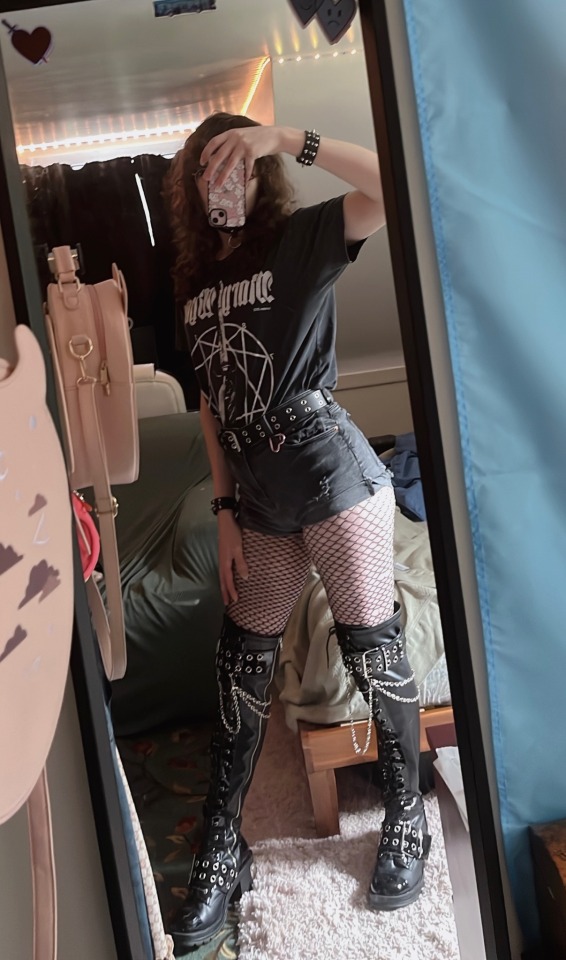Text
Communists and anarchists will spend all day talking about abstract concepts and structures like capitalism and the state, but willfully ignore the very real, tangible curse placed upon me by the foul necromancer
19K notes
·
View notes
Text
"without me" by eminem came on the radio and they fucking censored "I'm on the rag I'm ovulating" political correctness has gone too fucking far..
3K notes
·
View notes
Text

Isolated Marcille hanging off Falin in this panel
20K notes
·
View notes
Text
In contrast with professional drag queens, who were only playing at being women onstage, [Esther] Newton learned that the very bottom of the gay social hierarchy was the province of street queens. In almost total contrast to professional queens, street queens were "the underclass of the gay world." Although they embraced effeminacy, too, they did so in the wrong place and for the wrong reason: in public and outside of professional work. As a result, Newton explained, the street queens "are never off stage. Their way of life is collective, illegal, and immediate." Because they didn't get paid to be feminine and were locked out of even the most menial of nightlife jobs, Newton observed that their lives were perceived to revolve around "confrontation, prostitution, and drug 'highs'." Even in a gay underworld where everyone was marked as deviant, it was the sincere street queens who tried to live as women who were punished most for what was celebrated-and paid-as an act onstage. When stage queens lost their jobs, they were often socially excluded like trans women. Newton explained that when she returned to Kansas City one night during her fieldwork, she learned that two poor queens she had met had recently lost their jobs as impersonators. Since then, they had become "indistinguishable from street fairies," growing out their hair long and wearing makeup in public-even "passing" as girls in certain situations," in addition to earning a reputation for taking pills. They were now treated harshly by everyone in the local scene. Most people wouldn't even speak to them in public. Professional drag queens who didn't live as women still had to avoid being seen as too "transy" in their style and demeanor. One professional queen that Newton interviewed explained why: it was dangerous to be transy because it reinforced the stigma of effeminacy without the safety of being onstage. "I think what you do in your bed is your business," he told Newton, echoing a middle-class understanding of gay privacy, "[but] what you do on the street is everybody's business."
The first street queen who appears in Mother Camp is named Lola, a young Black trans girl who is "becoming a woman,' as they say'." Newton met Lola at her dingy Kansas City apartment, where she lived with Tiger, a young gay man, and Godiva, a somewhat more respectable queen. What made Godiva more respectable than Lola wasn't just a lack of hormonal transition. It was that Godiva could work as a female impersonator because she wasn't trying to sincerely live as a woman. Lola, on the other hand, was permanently out of work because being Black and trans made her unhireable, including in female impersonation. When Newton entered their apartment, which had virtually no furniture, she found Lola lying on "a rumpled-up mattress on the floor" and entertaining three "very rough-looking young men." These kinds of apartments, wrote Newton, "are not 'homes.' They are places to come in off the street." The extremely poor trans women who lived as street queens, like Lola, "literally live outside the law," Newton explained. Violence and assault were their everyday experiences, drugs were omnipresent, and sex work was about the only work they could do. Even if they didn't have "homes," street queens "do live in the police system."
As a result of being policed and ostracized by their own gay peers, Newton felt that street queens were "dedicated to "staying out of it" as a way of life. "From their perspective, all of respectable society seems square, distant, and hypocritical. From their 'place' at the very bottom of the moral and status structure, they are in a strategic position to experience the numerous discrepancies between the ideals of American culture and the realities." Yet, however withdrawn or strung out they were perceived to be, the street queens were hardly afraid to act. On the contrary, they were regarded by many as the bravest and most combative in the gay world. In the summer of 1966, street queens in San Francisco fought back at Compton's Cafeteria, an all-night venue popular with sex workers and other poor gay people. After management had called the police on a table that was hanging out for hours ordering nothing but coffee, an officer grabbed the arm of one street queen. As the historian Susan Stryker recounts, that queen threw her coffee in the police officer's face, "and a melee erupted." As the queens led the patrons in throwing everything on their tables at the cops-who called for backup-a full-blown riot erupted onto the street. The queens beat the police with their purses "and kicked them with their high-heeled shoes." A similar incident was documented in 1959, when drag queens fought back against the police at Cooper's Donuts in Los Angeles by throwing donuts-and punches. How many more, unrecorded, times street queens fought back is anyone's guess. The most famous event came in 1969, when street queens led the Stonewall rebellion in New York City. Newton shares in Mother Camp that she wasn't surprised to learn it was the street queens who carried Stonewall. "Street fairies," she wrote, "have nothing to lose."
Jules Gill-Peterson, A Short History of Trans Misogyny
4K notes
·
View notes
Note
i would actually like to hear more of your thoughts on whipping girl, whenever you feel ready enough to talk about it. i've only ever heard positive recommendations for it. i was thinking of reading it. i've read one or two introductory 101 texts on transmisogyny as well as some medium/substack posts, and always looking to read more as a tme person. ty!
thanks for asking! I'm gonna try to be concise because I'm stuck on my phone for the month, but here are my thoughts on whipping girl:
serano is at her strongest in the book in three areas: manifestations of transmisogyny in media (e.g. how trans caricatures pervade movies), the history of medical institutions developing a pathology of transsexuality (like the diagnostics of blanchard et al. or how trans people seeking healthcare were and continue to be forced into acting out prescribed expressions and manufacturing memories), and the construction of her own transition narrative (telling the reader what it was like for her to grow up desiring femininity in a way that confused her, the experience of crossdressing, the effects of hrt for her)
whenever she's just sticking to this, I think she effectively communicates a lot that the unaware reader could benefit from—even many trans women/transfems/tma people who are otherwise in tune with the history of medicalized transsexualism and our popular depictions could probably benefit from her own personal narrative, by nature of how variegated our experiences can be.
unfortunately I think the book fails at its primary—stated—goal, which is to theorize about transmisogyny. in the big picture this is a bifurcated failure:
on one branch of her argument, she remains committed to there being something biologically essential/innate about gender. this manifests thru multiple claims: that we have "innate inclinations" toward masculinity/femininity and "subconscious sex" rather than what I believe, which is that the latter are constructed categories imposed on different matrices of behaviour/expression/desire in different cultural contexts; that there is "definitely a biological component to gender" (close paraphrase) after a discussion of how she believes E and T tend to affect people (thus equivocating gender with dominant hormones!); that we have such a thing as "physical sex" which is the composition of our culturally decided "sex characteristics" (don't ask me how the dividing line is drawn) even as she says we should stop using "biological sex" as a term; that there is "no harm" in agreeing that "sex" is largely bimodal with some exceptions; that social constructionism is necessarily erasure of transsexual experiences in early childhood... altogether she is unwilling to relinquish arguments about the partial "innateness" of femininity/masculinity and gender. this is at tension with her admission on several occasions that these are neither culturally/geographically nor temporally stable concepts! but that doesn't seem to be a line she can follow thru on.
on another, intertwining branch, she engages in what I think is a deep and widespread mistake in the theorizing of transmisogyny: reducing it (mechanistically) to anti-effeminacy. it is her stated thesis at the start that masculinity is universally preferred to femininity. she doesn't offer a definition of either term until one of the final chapters, where she defines them as the behaviours and expressions associated with a particular gender. but I think this reduction just misunderstands transmisogyny. it is even in tension with an observation she makes early on, that trans women are often punished for their perceived masculinity! but again, this is a thought she seems unable or unwilling to follow thru with.
my problem with the thesis is that masculinity and femininity do not float free of gender—it is not possible to speak of their valuation in the abstract. anyone who grew up as a masculine cis girl and never "grew out" of that "phase" can attest to the violence wrought upon expressions of masculinity from women. and this applies doubly so to the subjects of transmisogyny! not only are we punished for any perceived bleed-through of masculinity from our supposed "underlying male selves", those of us who are willingly masculine and thriving as mascs are punished for our failure to conform to the rules of the normative womanhood that is imposed on us (just as we are punished for any willing femininity as "false" and predatory upon cis womanhood—observe that transmisogyny is reactive degendering in every case!).
on both branches serano makes only perfunctory remarks about the intersections with race, class, and colonialism. "sex" as such was made to only be accessible to the "civilized", most of all the white european! for a racialized person and particularly a Black person navigating gender the waters are just not the same; the signifiers of sex neither available in the same way, nor granted the same medical legitimacy. what is the "physical sex" of someone who is de-sexed altogether? how can gender have a "biologically innate" component when its expressions between the bourgeoisie and the working class are at total odds with one another? this all goes for the masculine/feminine distinctions as well. what sense is there in the claim that we have innately masculine/feminine inclinations when globally (and transmisogyny has been made global!) what is feminine and masculine can be very nearly mirrored? nor is "masculinity is always considered superior to femininity" innocent of obviating race. transmisogynoir adds yet further degendering thru the coercive masculinization of someone as a Black woman—masculinization as punishment, again!
and as a final point, the account fails to be materialist. there is no attempt to place transmisogyny in its role as an instrument of political economy or, as jules gill-peterson might say, as a tool of statecraft. it is just a psychological response to the way the world is, as far as serano has anything to say about it. but how did the world become that way, and why?? serano's solution, the abolition of what she calls gender entitlement, is naive to the fact that gender entitlement is necessary to the maintenance of the capitalist state, which is structured thru patriarchy and built on colonialism. it is not possible to reskin this into something innocuous!
this is why I cannot recommend whipping girl as a work about transmisogyny except at the most shallow level. it could be a helpful critical read, but imo, it is just wrong about transmisogyny.
2K notes
·
View notes
Text




cloud petting baby chocobos (or, the most important thing ff7 rebirth has given me so far)
470 notes
·
View notes
Text
this is your daily reminder that it's been over 65 years since cuba overthrew batista's US-backed fascist dictatorship and the US is STILL keeping cuba in extreme poverty using an "embargo."
back in the 1950s, using US funds and US-trained soldiers, batista (not castro) removed most of cubans' rights, including the right to strike, censored all media, and used secret police to torture and publicly excute anyone who protested his dictatorship. In a document released by the CIA in 2005, it stated as many as 20,000 people were killed. In return, batista gave control of most of the arable land to the US. during the revolution, this land was reclaimed and redistributed, which means that USAmericans can now sue anyone who "traffics" in this "confiscated" property.
Despite US sanctions being an "embargo," the US also fines foreign companies for doing business in Cuba, meaning it's effectively a blockade. Despite Obama lightening some of these restrictions, Biden has done little to undo the tightened policies from Trump's administration.
In November, the UN called for the 31st time (!!!) for the US blockade to end, supported by 187 countries and opposed only by the US and its bestest buddy (I'll let you guess who).
Cuba has been in economic crisis for years. Monthly income in Cuba is $30-60. There is very little food and it is hard to purchase anything like toiletries, clothes, and over-the-counter medicines. Domestic production is down because they don't have the resources to sustain them. The US has been intentionally impoverishing and starving Cuba for decades, and they continue to make it clear that it is not going to stop.
So, yeah. US democracy is a joke, end the US blockade on Cuba, and fuck genocide joe.
6K notes
·
View notes
Text

a separate post for polyhedron bg cause i spent a bit too much time on it
367 notes
·
View notes
Text

its october 1st, lets celebrate all month 。◕‿◕。
2K notes
·
View notes
Text

even the iron still fears the rot🗡️💀⛓️
11K notes
·
View notes
Text

i love it when people trap the warden in minecraft by making a moving piston that makes noise so the warden just quietly stares at it. ipad baby
51K notes
·
View notes





